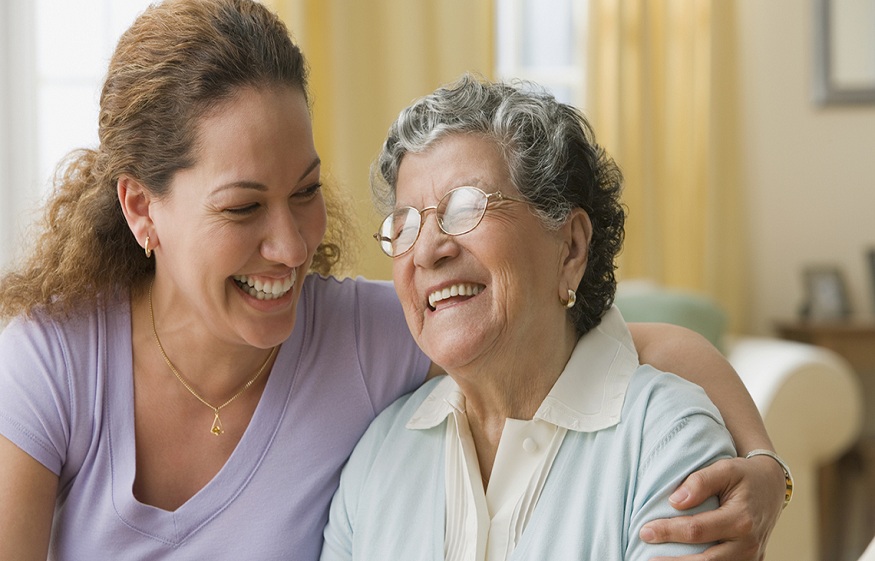Dependence of elderly family members on family caregivers

Adding to the current concerns of economic, climatic and political uncertainty is the growing uncertainty of old age. The world is facing an increase in the aging population that brings to light the many concerns of how to take proper care of the elderly.
It may come as a surprise to learn of the fact that the Elder Care today face distressing issues like poverty, decreased access to quality healthcare and yes, even emotional and physical abuse. However, maintaining healthy intergenerational ties with aging parents come with their own set of challenges. The parents, who spend their younger years taking care of their children, now need help to cope with the emotional and physical strain of growing old.
Caregivers today spend a considerable amount to time, money and energy to take care of their parents. They face the sudden realization that they missed the opportunity to plan ahead for their parents’ later infirmity, health insurance, living arrangements and financial security. This leaves them feeling overwhelmed and sometimes burdened with the thought of coping with their parents’ old age.
Many caregivers also suffer with caregiver syndrome, the typical symptoms of which include fatigue, insomnia, anxiety and depression. This is especially true for those caregivers who are taking care of the terminally ill, patients with Alzheimer’s, dementia or physical handicaps.
Some caregivers are busy with full-time jobs and children of their own to take care of. Another challenge faced by caregivers is the current threat of a COVID 19 infection. They are concerned with the co-morbidities that their aging parents face, the highly contagious nature of the virus and the inevitable fact that they could one day lose their parents to the pandemic.
A growing number of caregivers feel a sense of being ‘tied down’ while taking care of their parents. They are the ‘generation in the middle’ shuttling between catering to the demands of their own children and their aging parents, many of which are going through the physical and personality changes that come with growing old. They experience the frustration of cancelled vacation plans, not being able to meet work deadlines and the inability to spontaneously socialize with their friends and family to name a few.
On the other hand, parents feel torn between wanting to remain financially independent and depending on their adult children for help. There is a constant fear that they might run out of funds due to increased inflation and the cost of expensive health care.
Older people report a sense of higher satisfaction and well-being living within the community as opposed to living in institutions. However, living arrangements can become a major impediment to safety for the senior population. Rickety steps, faulty elevators, electrical repairs, heat and cold exposure are some of the factors that pose a threat to their well-being. If they live alone and are frail, they may become targets for thugs and other anti-social elements looking to take advantage of their situation. Caregivers who aren’t able to be present 24/7 often face the above problems in caring for the elderly.
A vast majority of older people do not live in institutions. Most of them do not wish to, nor do their families want to institutionalize them. They often view institutions as a sign of rejection. Caregivers place them there as a last resort but at the same time feel a tremendous reluctance and sense of guilt for doing so. Sometimes, due to their medical conditions or difficult family circumstances an institution may seem like the only solution.
As the population ages and women’s life expectancy continues to rise faster than men’s, the amount of elderly people in nursing homes will continue to be on the rise. The possibility of physical and psychological abuse in an institution is a concern for most elderly and their current caregivers. Many institutions have staff that is not properly trained in geriatrics and consequently many treatable conditions like depression, incontinence or anxiety are misdiagnosed or ignored leading to further deterioration.
Solutions to various caregiver problems
- Caregiver syndrome and burnout are common consequences of caring for the elderly. An awareness of this is crucial to seeking help and overcoming the problem. Sharing the responsibility with a sibling is imperative and provides relief for the major caregiver. In the case of single children, seeking the help of a mental health specialist or counselor is beneficial to understand and develop the tools required to cope with the situation.
- Planning for a life post retirement is an important conversation for parents and caregivers. Taking stock of available funds, applying for early medical insurance, deciding on living arrangements and security is crucial for living a well-adjusted life both for parents and caregivers later on.
- Forms of support like transportation, regular meals and home health aides are essential to helping the elderly cope well in their own homes with satisfaction.
- Finding ways to help them learn a new skill or connect with old hobbies and passions are essential to their ability to remain mentally alert and healthy.
- Being in touch with siblings, old friends and classmates via social media or in a social setting goes a long way in keeping them engaged and happy and consequently provides much relief for the caregiver.

 WHAT IS SLEEP APNEA AND WHY SHOULD YOU CARE?
WHAT IS SLEEP APNEA AND WHY SHOULD YOU CARE?  WHAT IS A VASECTOMY? EVERYTHING YOU NEED TO KNOW
WHAT IS A VASECTOMY? EVERYTHING YOU NEED TO KNOW  Vaccination Schedules For Cats And Dogs: What Every Pet Owner Should Know
Vaccination Schedules For Cats And Dogs: What Every Pet Owner Should Know  The History and Cultural Significance of Ayahuasca
The History and Cultural Significance of Ayahuasca  Understanding Common Health Issues in Small Animals: Insights from a Veterinarian’s Perspective
Understanding Common Health Issues in Small Animals: Insights from a Veterinarian’s Perspective  Navigating Your Pet’s Health: What to Expect from Your General Veterinarian
Navigating Your Pet’s Health: What to Expect from Your General Veterinarian  How to Protect Your Enamel from Everyday Wear
How to Protect Your Enamel from Everyday Wear  Tennessee Men’s Clinic Highlights the Transformative Power of Fitness on Men’s Lives
Tennessee Men’s Clinic Highlights the Transformative Power of Fitness on Men’s Lives  Behind the Scenes: A Day in the Life of a Veterinary Hospital Staff Member
Behind the Scenes: A Day in the Life of a Veterinary Hospital Staff Member